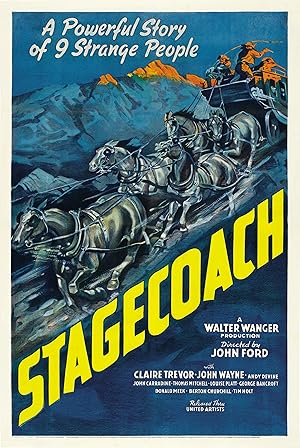Stagecoach
| 1939Directed by: John Ford
Main Plot
Stagecoach follows a diverse group of passengers traveling together on a stagecoach through the dangerous terrain of the American West. As they embark on their journey, the group includes a pregnant woman, a whiskey salesman, a doctor, a lawman, and a notorious outlaw, among others. The passengers must navigate their differences and prejudices as they face the threat of an impending Apache attack. Tensions rise within the coach as personal histories and secrets are revealed, challenging the characters to confront their own biases and fears. The journey becomes a test of survival, forcing the group to work together despite their varied backgrounds and motivations. As they travel deeper into hostile territory, the stakes grow higher, leading to moments of bravery, conflict, and unexpected alliances. The film explores themes of camaraderie, redemption, and the harsh realities of frontier life.
Characters
- John Wayne plays the Ringo Kid, an outlaw seeking revenge against the murderers of his father and brother while traveling with diverse passengers on a dangerous journey.
- Claire Trevor played Dallas, a social outcast and prostitute seeking redemption and a fresh start as she travels through dangerous territory with other passengers.
- Andy Devine plays Buck, the stagecoach driver, responsible for navigating dangerous terrain and ensuring the safety of the diverse group of passengers.
Ending Explained
In the ending of Stagecoach, the tension reaches its peak as the stagecoach, carrying a diverse group of passengers, is ambushed by a group of Apache warriors. The passengers, who have formed uneasy alliances throughout their journey, must band together to survive this life-threatening situation. The climax unfolds with a fierce battle, showcasing the characters' growth and the shifting dynamics among them. As the stagecoach is besieged, the passengers demonstrate bravery and resourcefulness, ultimately leading to a dramatic rescue. The arrival of the cavalry signifies hope and marks a turning point in the conflict. The Apache are driven away, and the survivors emerge from the ordeal changed, having confronted their prejudices and fears. In the aftermath, the resolution of the main conflict is evident as the characters reflect on their experiences. The journey has forced them to confront their differences and find common ground. The film concludes with a sense of camaraderie among the passengers, suggesting that shared adversity can bridge divides. The ending encapsulates the themes of unity and redemption, reinforcing the idea that even in the face of danger, human connection can prevail.
